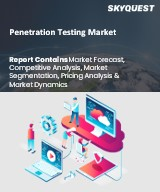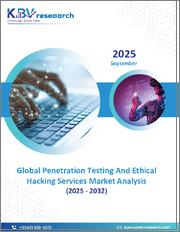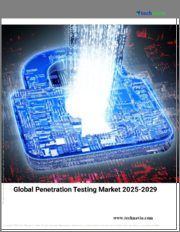
|
시장보고서
상품코드
1642356
침투 테스트 시장 평가 : 구성요소, 배포 모드, 유형, 기업 규모, 최종 사용자 산업, 지역별 기회 및 예측(2018-2032년)Penetration Testing Market Assessment, By Component, By Deployment Mode, By Type, By Company Size, By End-user Industry, By Region, Opportunities and Forecast, 2018-2032F |
||||||
전 세계 침투 테스트 시장 규모는 2024년 25억 1,000만 달러에서 예측 기간 동안 14.70%의 연평균 복합 성장률(CAGR)로 성장하여 2032년에는 75억 2,000만 달러에 달할 것으로 예상됩니다.
침투 테스트 시장은 AI 및 자동화와 같은 첨단 사이버 보안 기술 덕분에 성장하고 있으며, IBM Corporation의 보고서에 따르면 보안 AI 및 자동화가 침투 테스트 비용을 최소화하여 약 2,200만 달러의 비용을 절감하는 데 도움이 되고 있습니다. 절감하고 있습니다. 조직은 사이버 위협에 악용되기 전에 취약점을 파악하기 위해 사전 예방적 보안 평가를 수행하는 데 집중하고 있습니다. 침투 테스트는 실제 공격을 시뮬레이션하여 문제를 해결하고, 기업이 취약점을 효과적으로 해결하면서 보안 태세를 분석할 수 있도록 돕습니다. 데이터 유출 및 사이버 공격이 증가함에 따라, 보안 대책 개선에 대한 기업의 인식이 높아지고 있습니다.
또한, 규제 준수 요건이 강화되면서 기업들은 업계 표준을 준수하기 위해 정기적인 침투 테스트를 고려하고 있습니다. 또한, 클라우드 서비스 및 IoT 도입이 증가함에 따라 새로운 취약점 평가가 도입되어 복잡성이 증가하고 있습니다. 원격 근무와 디지털 전환의 확산으로 공격 대상 영역이 확대되면서 침투 테스트는 모든 조직의 사이버 보안 전략에 필수적인 요소로 자리 잡고 있습니다. 기업들이 사이버 보안에 대한 투자를 우선시하는 가운데, 기밀 정보를 보호하고 고객과의 신뢰를 유지하기 위해 이러한 평가에서 중요한 역할을 하는 침투 테스트 서비스에 대한 수요가 증가할 것으로 예상됩니다.
세계 침투 테스트(Penetration Testing) 시장을 조사했으며, 시장 정의와 개요, 시장 규모 추이 및 예측, 각종 분류별 상세 분석, 시장 성장에 영향을 미치는 요인 분석, 사례 연구, 경쟁 구도, 주요 기업 프로파일 등의 정보를 정리하여 전해드립니다.
목차
제1장 프로젝트의 범위와 정의
제2장 조사 방법
제3장 주요 요약
제4장 고객의 소리
- 제품 및 시장 인텔리전스
- 브랜드 인지 모드
- 구입 결정시에 고려되는 요소
- 프라이버시와 규제에 관한 인사이트
제5장 세계의의 침투 테스트 시장 전망
- 시장 규모 분석과 예측
- 시장 점유율 분석과 예측
- 컴포넌트별
- 전개 모드별
- 유형별
- 기업 규모별
- 최종사용자 산업별
- 지역별
- 기업 점유율 분석(주요 5개사 및 기타)
- 시장 맵 분석
제5장 북미의 침투 테스트 시장 전망
- 시장 규모 분석과 예측
- 시장 점유율 분석과 예측
- 국가별 시장 평가
- 미국
- 캐나다
- 멕시코
제7장 유럽의 침투 테스트 시장 전망
- 독일
- 프랑스
- 이탈리아
- 영국
- 러시아
- 네덜란드
- 스페인
- 터키
- 폴란드
제8장 아시아태평양의 침투 테스트 시장 전망
- 인도
- 중국
- 일본
- 호주
- 베트남
- 한국
- 인도네시아
- 필리핀
제9장 남미의 침투 테스트 시장 전망
- 브라질
- 아르헨티나
제10장 중동 및 아프리카의 침투 테스트 시장 전망
- 사우디아라비아
- 아랍에미리트(UAE)
- 남아프리카공화국
제11장 Porter의 Five Forces 분석
제12장 PESTLE 분석
제13장 시장 역학
- 시장 성장 촉진요인
- 시장이 해결해야 할 과제
제14장 시장 동향 및 전개
제15장 사례 연구
제16장 경쟁 구도
- 주요 5개사의 경쟁 매트릭스
- 주요 5개사의 SWOT 분석
- 주요 10개사 상황
- Acunetix(Invicti Security)
- BreachLock Inc.
- Checkmarx Ltd.(Hellman & Friedman LLC)
- Clavax
- CrowdStrike, Inc.
- International Business Machines Corp.
- Rapid7, Inc.
- Secureworks Inc.
- Synopsys Inc.
- Veracode, Inc.
제17장 전략적 제안
제18장 리서치사에 대해 & 면책사항
LSH 25.02.19Global penetration testing market is projected to witness a CAGR of 14.70% during the forecast period 2025-2032, growing from USD 2.51 billion in 2024 to USD 7.52 billion in 2032.
The penetration testing market is experiencing growth due to advanced cybersecurity technologies, such as AI and automation. IBM Corporation reported that security AI and automation have helped minimize breach costs, saving around USD 2.2 million for breaching. Organizations are focusing on conducting proactive security assessments to identify vulnerabilities before cyber threats exploit them. Penetration testing simulates real attacks to tackle the challenges, and companies can analyze security posture while effectively addressing weaknesses. The increasing rate of data breaches and cyberattacks has increased awareness among businesses about improving robust security practices.
Furthermore, regulatory compliance requirements are becoming strict, driving organizations to consider regular penetration tests to adhere to industry standards. Also, the increasing adoption of cloud services and the Internet of Things (IoT) introduce new vulnerability assessments with increasing complexity. Remote work and digital transformation initiatives have also increased the attack surface, and therefore, penetration testing has become an integral part of any organization's cybersecurity strategy. Demand for penetration testing services is likely to grow as a critical role in these assessments by protecting sensitive information and maintaining trust with customers as companies prioritize cybersecurity investments. Hence, the development of cybersecurity promotes a more proactive and resilient future in the penetration testing market.
For example, in November 2024, CrowdStrike Holdings, Inc. launched AI Red Team Services to enhance security for AI systems. These services proactively identify vulnerabilities, helping organizations defend against emerging threats like model tampering and data poisoning.
Emergence of the Internet of Things Drives Growth in the Penetration Testing Market
IoT device development considerably drives penetration testing growth as more organizations embrace IoT technology, allowing cybercriminals to exploit new vulnerabilities. These devices lack robust security measures, making them the most appealing targets for attacks. Penetration testing also assists organizations in identifying and repairing these vulnerabilities before exploitation. This proactive approach is crucial in preserving sensitive data and maintaining integrity in connected systems. Additionally, regulatory bodies are working to advance security standards in IoT devices. This would require firms to undertake more frequent penetration testing by the required compliance standards, and with pressure from both regulatory enforcement and the growing realization of cyber threats using IoT devices, businesses become interested in keeping their systems secure through security assessments. This makes the penetration testing market grow as organizations must develop effective security strategies and ensure that their networks are protected and that their customers' trust in their systems is secured.
For example, in August 2024, Veracode, Inc. unveiled innovations to tackle security debt, revealing that developers prioritize low-severity flaws over critical ones. As IoT devices proliferate, these advancements aim to help organizations effectively manage application risks and enhance penetration testing efforts across their attack surfaces.
Digital Transformation Boosts the Penetration Testing Market
The penetration testing market is growing rapidly due to digital transformation across various sectors as organizations adopt new technologies like cloud computing and mobile applications. This complexity releases the potential for security vulnerabilities, making effective cybersecurity measures necessary. Digital transformation increases operational efficiency and innovation as well as expands the attack surface for cyber threats. It has made organizations highly aware of the risks associated with these technologies and increased the focus on security assessments to protect their digital assets. Penetration testing simulates real-world attacks, allowing the firms to identify weaknesses in systems and proactively address them. The regulations are forcing many industries to obligate regular penetration testing to make them adhere to these standards with increasing regulatory requirements for data protection and cybersecurity. Hence promoting the demand for these services in the penetration testing market in the forecasted period.
For example, in September 2024, Rapid7, Inc. launched Vector Command, a continuous red teaming service to enhance security amid digital transformation. This proactive solution helps organizations assess their external attack surfaces, validate vulnerabilities, and mitigate risks in an increasingly complex cyber threat landscape.
Government Initiatives Fuel Penetration Testing Market Growth
Government initiatives, such as the National Institute of Standards and Technology (NIST) Cybersecurity Framework (CSF) and the European Union General Data Protection Regulation (GDPR), are driving revenue growth in the penetration testing market. The NIST CSF advises organizations to adopt a systematic approach to cybersecurity, including conducting regular security assessments and penetration testing. This recommendation encourages businesses to invest in penetration testing services to detect and address weaknesses, thus raising the demand for such services. Similarly, the GDPR compels companies to conduct penetration testing through regular security assessments to ensure compliance and protect sensitive personal data. The potential for substantial fines for non-compliance further incentivizes organizations to prioritize penetration testing.
For example, in March 2023, the United States Administration's National Cybersecurity Strategy emphasized robust cybersecurity measures, driving demand for penetration testing services as organizations seek to secure digital infrastructures amid increasing cyber threats and reliance on technology.
Banking, Financial Services, and Insurance Industry Dominates the Penetration Testing Market
The banking, financial services, and insurance (BFSI) sector is a significant driver of the penetration testing market, as it requires robust cybersecurity measures to protect sensitive financial data. It deals with enormously sensitive financial data, which makes it a prime target for cyberattacks. Regulatory bodies strictly advise financial institutions to perform penetration testing and other regular security assessments. These assessments identify potential vulnerabilities in systems and applications, which ensure that threats are mitigated before they can be executed. Additionally, digital banking and online financial services have increased the surface of attacks that require security strategies. Therefore, BFSI organizations ensure their systems are secure as they adopt newer technologies like mobile banking and cloud services. The growing concern for cybersecurity in the BFSI sector is driving the demand for penetration testing services, thus making it a leading market for penetration testing.
North America Holds a Major Share in the Global Penetration Testing Market
North America leads the penetration testing market with numerous technology-driven companies that consider cybersecurity to be a prime necessity. These organizations understand that penetration testing can help identify vulnerabilities to safeguard sensitive data and retain customer trust with the increasing frequency of cyberattacks. North America has a well-established regulatory environment that strictly enforces compliance with cybersecurity standards. The Sarbanes-Oxley Act and the Health Insurance Portability and Accountability Act (HIPAA) provide regulations that require organizations to conduct regular security assessments, including penetration testing. Additionally, North America possesses a skilled cybersecurity workforce, with many educational institutions and training programs offering continuous advancement in its penetration testing methodologies and technologies. Also, growing awareness of cybersecurity risks by businesses and consumers is fueling investment in security solutions, further propelling the penetration testing market in North America.
For instance, in August 2024, BreachLock, Inc. unveiled its Penetration Testing as a Service (PaaS), offering new features like Attack Path Validation and Mapping, promoting innovations and growth in the penetration testing market.
Future Market Scenario (2025-2032F)
The penetration testing market is likely to see the emergence of automated tools and solution that can support organizations to conduct assessments more efficiently, leading to faster vulnerability identification and reduced costs.
The penetration testing services may increasingly incorporate artificial intelligence and machine learning, which can enhance threat detection and analysis, thereby facilitating more sophisticated testing that appropriately adapts to evolving cyber threats.
National governments may enforce strict guidelines that mandate regular penetration tests across different sectors as cyber threats increase.
Penetration testing is likely to shift with unique vulnerabilities in environments associated with the cloud with the rise of cloud-based services fostering increased demand for testing services designed specifically for cloud security.
Key Players Landscape and Outlook
The cybersecurity landscape is increasingly shaped by leaders focusing on innovative solutions to address emerging threats, particularly in penetration testing, attack surface management, and application security. Continuous innovation drives the adoption of newer technologies that enhance security measurements and streamline deployment processes. A significant trend is the automation of features, which provides real-time insight into vulnerability and attack trends. The capability enables security teams to proactively identify and respond effectively. Collaboration with cloud service providers is also essential as it helps organizations streamline vulnerability management and respond quickly to security incidents. Also, the growth of AI is driving innovation in industry-specific services that evaluate and protect AI systems against unique threats, including model tampering and data poisoning. They focus on proactive defensive strategies, real-world attack simulations, and comprehensive security validation to further enhance resilience and promote growth in the penetration testing market in the forecasted period.
In October 2024, Check Point Software Technologies Ltd. acquired Cyberint Technologies Ltd., enhancing its Infinity Platform with advanced external risk management solutions, including penetration testing capabilities, to better protect organizations from evolving cyber threats.
In December 2023, Chubb Limited partnered with NetSPI, Inc. to enhance cyber protection for the United States and Canadian policyholders, offering advanced penetration testing and attack surface management solutions to identify vulnerabilities and strengthen security proactively.
Table of Contents
1. Project Scope and Definitions
2. Research Methodology
3. Executive Summary
4. Voice of Customer
- 4.1. Product and Market Intelligence
- 4.2. Mode of Brand Awareness
- 4.3. Factors Considered in Purchase Decisions
- 4.3.1. Features and Other Value-Added Service
- 4.3.2. IT Infrastructure Compatibility
- 4.3.3. Efficiency of Solutions
- 4.3.4. After-Sales Support
- 4.4. Consideration of Privacy and Regulations
5. Global Penetration Testing Market Outlook, 2018-2032F
- 5.1. Market Size Analysis & Forecast
- 5.1.1. By Value
- 5.2. Market Share Analysis & Forecast
- 5.2.1. By Component
- 5.2.1.1. Solution
- 5.2.1.2. Services
- 5.2.2. By Deployment Mode
- 5.2.2.1. On-Premises
- 5.2.2.2. Cloud Based
- 5.2.3. By Type
- 5.2.3.1. Internal and External Network Penetration Testing
- 5.2.3.2. Wireless Penetration Testing
- 5.2.3.3. Web Application Testing
- 5.2.3.4. Mobile Application Testing
- 5.2.3.5. Cloud Penetration Testing
- 5.2.3.6. Social Engineering
- 5.2.3.7. Others
- 5.2.4. By Company Size
- 5.2.4.1. Large Enterprises (>1000 Employees)
- 5.2.4.2. Small and Medium Enterprises (SMEs) (<1000 Employees)
- 5.2.5. By End-User Industry
- 5.2.5.1. Banking, Financial Services and Insurance (BFSI)
- 5.2.5.2. Retail and E-commerce
- 5.2.5.3. IT and ITeS
- 5.2.5.4. Telecommunication
- 5.2.5.5. Manufacturing
- 5.2.5.6. Education
- 5.2.5.7. Others
- 5.2.6. By Region
- 5.2.6.1. North America
- 5.2.6.2. Europe
- 5.2.6.3. Asia-Pacific
- 5.2.6.4. South America
- 5.2.6.5. Middle East and Africa
- 5.2.7. By Company Market Share Analysis (Top 5 Companies and Others - By Value, 2024)
- 5.2.1. By Component
- 5.3. Market Map Analysis, 2024
- 5.3.1. By Component
- 5.3.2. By Deployment Mode
- 5.3.3. By Type
- 5.3.4. By Company Size
- 5.3.5. By End-User Industry
- 5.3.6. By Region
6. North America Penetration Testing Market Outlook, 2018-2032F*
- 6.1. Market Size Analysis & Forecast
- 6.1.1. By Value
- 6.2. Market Share Analysis & Forecast
- 6.2.1. By Component
- 6.2.1.1. Solution
- 6.2.1.2. Services
- 6.2.2. By Deployment Mode
- 6.2.2.1. On-Premises
- 6.2.2.2. Cloud Based
- 6.2.3. By Type
- 6.2.3.1. Internal and External Network Penetration Testing
- 6.2.3.2. Wireless Penetration Testing
- 6.2.3.3. Web Application Testing
- 6.2.3.4. Mobile Application Testing
- 6.2.3.5. Cloud Penetration Testing
- 6.2.3.6. Social Engineering
- 6.2.3.7. Others
- 6.2.4. By Company Size
- 6.2.4.1. Large Enterprises (>1000 Employees)
- 6.2.4.2. Small and Medium Enterprises (SMEs) (<1000 Employees)
- 6.2.5. By End-User Industry
- 6.2.5.1. Banking, Financial Services and Insurance (BFSI)
- 6.2.5.2. Retail and E-commerce
- 6.2.5.3. IT and ITeS
- 6.2.5.4. Telecommunication
- 6.2.5.5. Manufacturing
- 6.2.5.6. Education
- 6.2.5.7. Others
- 6.2.6. By Country Share
- 6.2.6.1. United States
- 6.2.6.2. Canada
- 6.2.6.3. Mexico
- 6.2.1. By Component
- 6.3. Country Market Assessment
- 6.3.1. United States Penetration Testing Market Outlook, 2018-2032F*
- 6.3.1.1. Market Size Analysis & Forecast
- 6.3.1.1.1. By Value
- 6.3.1.2. Market Share Analysis & Forecast
- 6.3.1.2.1. By Component
- 6.3.1.2.1.1. Solution
- 6.3.1.2.1.2. Services
- 6.3.1.2.2. By Deployment Mode
- 6.3.1.2.2.1. On-Premises
- 6.3.1.2.2.2. Cloud Based
- 6.3.1.2.3. By Type
- 6.3.1.2.3.1. Internal and External Network Penetration Testing
- 6.3.1.2.3.2. Wireless Penetration Testing
- 6.3.1.2.3.3. Web Application Testing
- 6.3.1.2.3.4. Mobile Application Testing
- 6.3.1.2.3.5. Cloud Penetration Testing
- 6.3.1.2.3.6. Social Engineering
- 6.3.1.2.3.7. Others
- 6.3.1.2.4. By Company Size
- 6.3.1.2.4.1. Large Enterprises (>1000 Employees)
- 6.3.1.2.4.2. Small and Medium Enterprises (SMEs) (<1000 Employees)
- 6.3.1.2.5. By End-User Industry
- 6.3.1.2.5.1. Banking, Financial Services and Insurance (BFSI)
- 6.3.1.2.5.2. Retail and E-commerce
- 6.3.1.2.5.3. IT and ITeS
- 6.3.1.2.5.4. Telecommunication
- 6.3.1.2.5.5. Manufacturing
- 6.3.1.2.5.6. Education
- 6.3.1.2.5.7. Others
- 6.3.1.2.1. By Component
- 6.3.1.1. Market Size Analysis & Forecast
- 6.3.2. Canada
- 6.3.3. Mexico
- 6.3.1. United States Penetration Testing Market Outlook, 2018-2032F*
All segments will be provided for all regions and countries covered
7. Europe Penetration Testing Market Outlook, 2018-2032F
- 7.1. Germany
- 7.2. France
- 7.3. Italy
- 7.4. United Kingdom
- 7.5. Russia
- 7.6. Netherlands
- 7.7. Spain
- 7.8. Turkey
- 7.9. Poland
8. Asia-Pacific Penetration Testing Market Outlook, 2018-2032F
- 8.1. India
- 8.2. China
- 8.3. Japan
- 8.4. Australia
- 8.5. Vietnam
- 8.6. South Korea
- 8.7. Indonesia
- 8.8. Philippines
9. South America Penetration Testing Market Outlook, 2018-2032F
- 9.1. Brazil
- 9.2. Argentina
10. Middle East and Africa Penetration Testing Market Outlook, 2018-2032F
- 10.1. Saudi Arabia
- 10.2. UAE
- 10.3. South Africa
11. Porter's Five Forces Analysis
12. PESTLE Analysis
13. Market Dynamics
- 13.1. Market Drivers
- 13.2. Market Challenges
14. Market Trends and Developments
15. Case Studies
16. Competitive Landscape
- 16.1. Competition Matrix of Top 5 Market Leaders
- 16.2. SWOT Analysis for Top 5 Players
- 16.3. Key Players Landscape for Top 10 Market Players
- 16.3.1. Acunetix (Invicti Security)
- 16.3.1.1. Company Details
- 16.3.1.2. Key Management Personnel
- 16.3.1.3. Products and Services
- 16.3.1.4. Financials (As Reported)
- 16.3.1.5. Key Market Focus and Geographical Presence
- 16.3.1.6. Recent Developments/Collaborations/Partnerships/Mergers and Acquisitions
- 16.3.2. BreachLock Inc.
- 16.3.3. Checkmarx Ltd. (Hellman & Friedman LLC)
- 16.3.4. Clavax
- 16.3.5. CrowdStrike, Inc.
- 16.3.6. International Business Machines Corp.
- 16.3.7. Rapid7, Inc.
- 16.3.8. Secureworks Inc.
- 16.3.9. Synopsys Inc.
- 16.3.10. Veracode, Inc.
- 16.3.1. Acunetix (Invicti Security)
Companies mentioned above DO NOT hold any order as per market share and can be changed as per information available during research work.



















